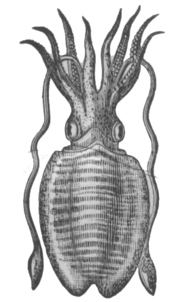Tentacle
|
|
Missing image Regialeaf.jpg The tentacles of a sundew plant |
Tentacles can refer to the elongated flexible organs that are present in many invertebrates, and sometimes to the hairs of the leaves of insectivorous plants. Generally tentacles are mostly used for feeding and grasping.
| Contents |
Tentacles in marine animals
The phylum mollusca includes many species with tentacles. Octopuses do not have tentacles, they have arms. Tentacles are longer than arms and they usually only have suckers at their tips. Squids and cuttlefish have eight arms like octopuses, but in addition they have two tentacles, so the two tentacles can in fact be a good way to distinguish squids from octopuses.
Cnidarians, which include among others the jellyfishes, are another phylum with many tentaculated specimens. Cnidarians often have huge numbers of cnidocytes on their tentacles. Cnidocytes are cells containing a coiled thread-like structure called nematocyst, which can be fired at potential prey.
Many species of the jellyfishlike ctenophores have two tentacles, while some have none. Their tentacles have adhesive structures called colloblasts or lasso cells. These cells burst open when prey comes in contact with the tentacle; sticky threads released from each of the colloblasts will then capture the food.
Bryozoa ("Moss animals") are tiny creatures with a ring of tentacles surrounding the mouth.
Tentacles in amphibians
Some wormlike amphibians have tentacles. The caecilians have two tentacles at their head, which are probably used for the olfactory sense, in addition to their nose.
Tentacles in plants
In carnivorous plants, tentacles refer to the stalked glands of the upper surface of the leaves. They are hairlike projections with a drop of nectarlike glue which attract insects. When an insect is captured, the tentacles bend inward and the leaf rolls together as shown in the picture. When the insect is captured, the tentacles secrete digestive enzymes to dissolve and engulf the insect.
Tentacles in cultural context
The great differences between humans and the tentacle -bearing mollusca have led to tentacles being associated with inhumanity and disgust in many human legends, and in fiction. For examples, see:
- Tentacle rape
- Purple Tentacle (see Day of the Tentacle)
- Cthulhuda:Fangarm

